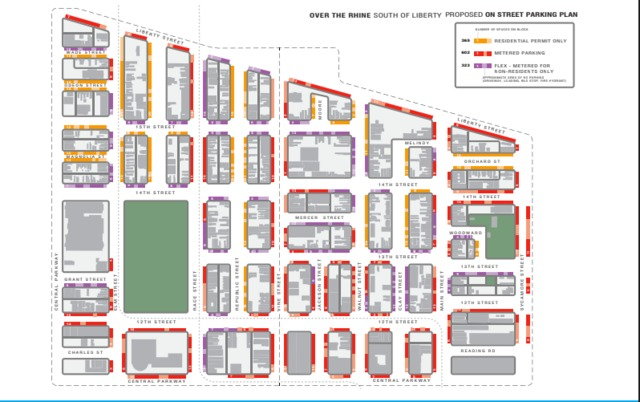Officials with the city of Cincinnati have revised a proposed parking permit plan for bustling Over-the-Rhine, removing caps on the number of permits available and lowering the price.
Under the revised plan, the city would sell an uncapped number of permits for OTR residents south of Liberty Street. The regular rate would be $60 a year — down significantly from the original proposal of $150 a year. Low-cost permits would be available to residents of subsidized housing at $25 a year.
The plan would cost the city about $180,000 in initial signage and other expenses, and about $75,000 a year to administer. Those costs would be covered by the fees from the permits.
Five hundred of the 1,290 spaces in the neighborhood would be permit spots. The spots are needed, city administration says, because OTR has become increasingly popular as a destination.
"Since 2003, the City of Cincinnati made concerted effort to revitalize Over-the-Rhine," a memo from acting Cincinnati City Manager Patrick Duhaney reads. "A combination of public and private investment has brought residents, businesses and amenities to the neighborhood... the success, however, has created new conflicts. With more people choosing to live, visit or work in OTR, parking spaces are at a premium."
Parts of Clifton, Columbia Tusculum and Pendleton already have permit programs, but those cost $30 a year.
Not everyone is on board with the plan just yet. The Over-the-Rhine Community Council has concerns and was not notified of the city's adjustments until earlier this week, according to a letter from council president Maurice Wagoner.
The letter notes that the plan seems closer to what the community council would like to see, it contains two elements that raise concerns. One issue, according to Wagoner — that the price of the permits is not written into the legislation but left up to the city manager, creating uncertainty about the price in the future. The other is the two-level price of the permits, something the council says isn't done in other cities.
"In our research, no other city creates this distinction based on housing status or income," the letter reads. "We have repeatedly expressed our opposition to this approach and seek an opportunity for further discussion about alternative solutions."
The parking plan has taken a long, winding path to get to this point.
In February 2016, Cincinnati City Council directed city administration to create the task force on parking in OTR made up of staff from the offices of the city manager, the department of community and economic development, the city's parking division, the transportation and engineering department and city planning. The task force also tapped Walker Parking Consultants, community groups in OTR and development organizations as well as holding public input sessions.
Another prong of the original plan, removal of minimum parking requirements for developers building in downtown, OTR, Pendleton and parts of the West End and Mount Auburn, would encourage more pedestrian-friendly development and eventually decrease the number of cars in the neighborhood, the group says. The task force cites the removal of parking minimums in parts of Cleveland, Nashville and Kansas City, Mo. as examples of the concept elsewhere.
Last week, the Cincinnati Planning Commission approved that part of the proposal. It will now go before Cincinnati City Council.
"Parking minimums are well-intended, but they are an unnecessary regulation that violate their own stated goals of reducing traffic, threaten walkability, and lead to blight in our cherished urban fabric in Over-the-Rhine," the report from the task force states.
Either part of the plan could prove controversial. Cincinnati City Council has twice tried to pass a permit plan before, only to have their attempts swatted down by Mayor John Cranley. The city's latest suggestion is similar to those plans. And critics of removing mandatory parking minimums for developers say the move amounts to another concession to developers who are already getting tax abatements and other incentives from the city while making parking in OTR more difficult to find.


